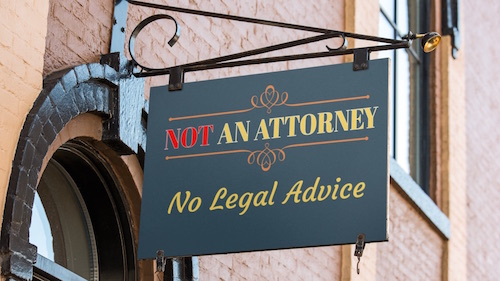This is the most popular thing I’ve ever written. Reprinting it is this blog’s New Year’s tradition.
Hope you enjoy it — complete with the original illustrations by Bobby Ocean. [continue reading…]
This is the most popular thing I’ve ever written. Reprinting it is this blog’s New Year’s tradition.
Hope you enjoy it — complete with the original illustrations by Bobby Ocean. [continue reading…]
A few days ago on Facebook I shared this rediscovered treasure from somewhere in my garage, asking who could tell me the record’s significance. [continue reading…]
In response to last week’s piece about the legal folly of airing a commercial that, for example, features two of your radio station’s salespeople pretending to be real customers and raving about the advertiser’s product/service, Michael R. Guimond posted this comment: [continue reading…]
 Last week I wrote what I thought was a fairly innocuous piece about advertisers who want the radio station’s voice to deliver the commercial copy in the first person (I/we) rather than the third person (they).
Last week I wrote what I thought was a fairly innocuous piece about advertisers who want the radio station’s voice to deliver the commercial copy in the first person (I/we) rather than the third person (they).
To my surprise, it generated a ton of response on Facebook.
Some people mentioned the Federal Trade Commission (FTC) regulations about “endorsements,” but no one seemed clear on what those regulations are.
As far as I know, the FTC never has directly addressed “having the station announcer speak as though s/he were the advertiser.”
The FTC has, however, published guidelines regarding the use of “endorsements” and “testimonials” in advertising. (The FTC guidelines use the two terms interchangeably.)
In my own, not-giving-legal-advice-I’m-not-a-lawyer-ask-your-own-attorney-if-you-want-advice opinion, a spot voiced by a radio station employee and featuring language such as “At Blauman Motors, we’re committed to…” does not appear to violate FTC guidelines.
The closest argument I can find for the opposite opinion is the requirement that the advertisement isn’t misleading.
If you want to argue that the announcer’s speaking in the first person implies an endorsement of the product or service, then the question becomes:
“Can listeners reasonably be expected to understand that person is saying ‘I/we’ is doing so because that person is being paid to read a commercial script?”
The FTC states, “If there’s a connection between an endorser and the marketer that consumers would not expect and it would affect how consumers evaluate the endorsement, that connection should be disclosed. For example….if the endorser has been paid or given something of value to tout the product.”
Yes, the voice talent is being paid “to tout the product.”
But is it reasonable to assume listeners understand that?
And is it reasonable to equate “reading commercial copy in the first person” with “endorsement”?
Personally, I think that’s a tough legal argument to proffer.
But there’s a different potential violation that regularly occurs at many radio stations: the spot that includes two of the station’s account executives pretending to be real customers giving real testimonials for the advertiser.
If those two people succeed in convincing listeners they’re real customers giving real testimonials, that would appear to be a clear violation of FTC guidelines.
A while ago, for my Radio Advertising Advantage members, I interviewed Peter Hoppenfeld, an attorney specializing in helping businesses market aggressively yet legally.
Peter responded directly to my question about that type of fake testimonial:
“Endorsements must reflect the honest opinions, findings, beliefs or experience of the endorser…”
Oops. Notice the word “honest”?
Peter also offered a warning for anyone in the radio station or ad agency who volunteers or is pressed into duty as a fake “satisfied customer”:
The advertiser isn’t the only one who can get in trouble.
“Endorsers also may be liable for statements made in the course of their endorsements.”
I know, you’re thinking: “Heck, the FTC won’t care.”
Again, I am not attempting nor qualified to dispense legal advice.
Speaking as a non-lawyer, however, I suspect “We thought the FTC wouldn’t care” might not be an effective legal defense.
“One of the account executives at my radio station group has a client that is determined to have us use 1st person (we, our, us) in their spot even though we’re using an in-house, on air voice. I’ve explained my position on the issue (the in-house, on-air voice works here, not for the client, so 3rd person — they, their, them — is the appropriate perspective).
“I gave her the option of the client providing an off-air and/or out-of-market voice that COULD do the spot in 1st person, but the AE has asked again, saying ‘These other stations always did it for them, so even though it’s not appropriate can we still do it?’
“This has been a rule of mine for years, but if you think it’s no biggie then I’ll relent and do what they want.”
Dan Replies:
“And if all the other stations jump off a bridge…?”
I was prepared to write a lengthy “on the other hand…” response until I saw this:
“These other stations always did it for them, so even though it’s not appropriate can we still do it?”
The radio salesperson agrees with you that it’s inappropriate?
Why does the conversation continue past that point of agreement?
Either your station group has clearly defined standards or it doesn’t.
An advertiser’s waving money at the AE should have no effect on your group’s standards.